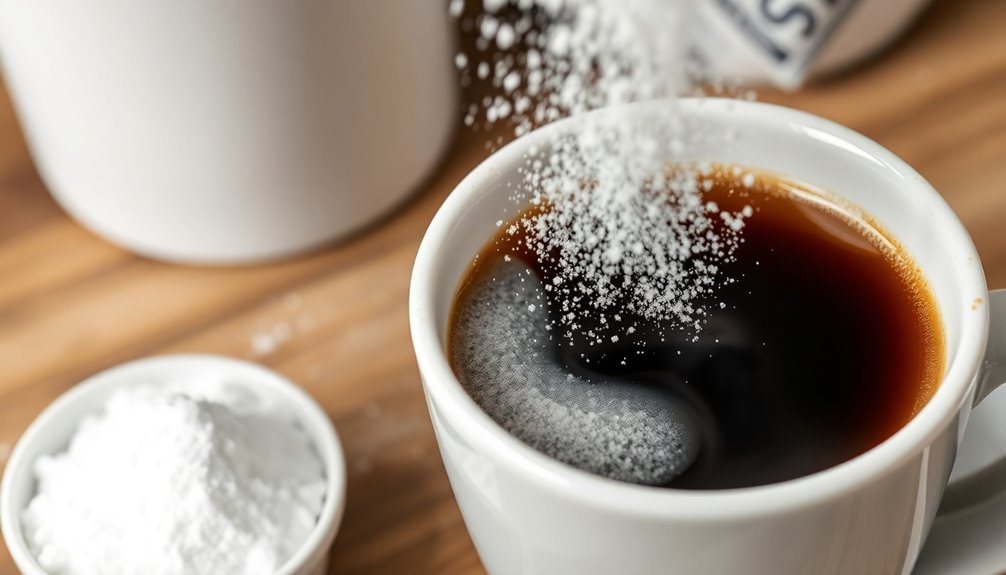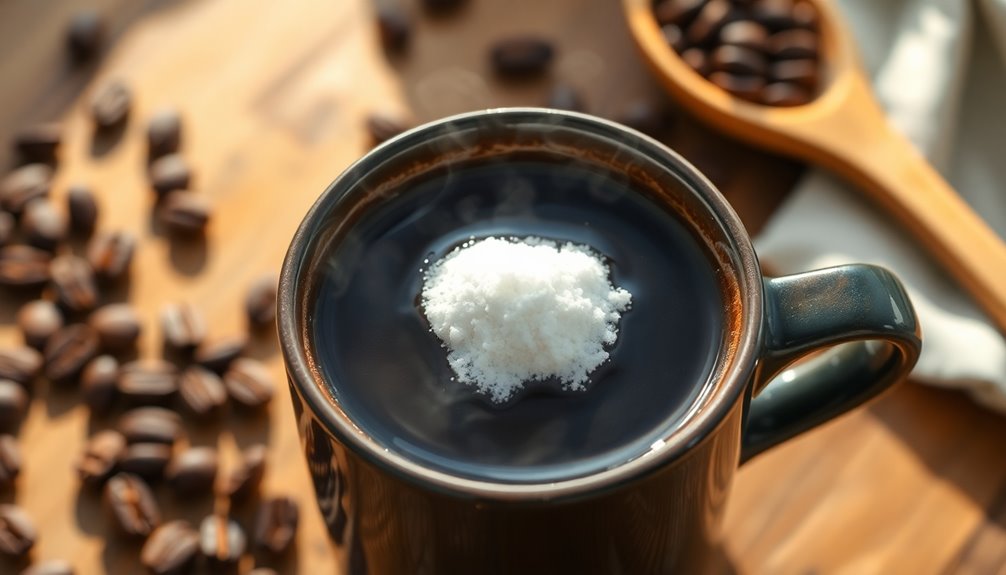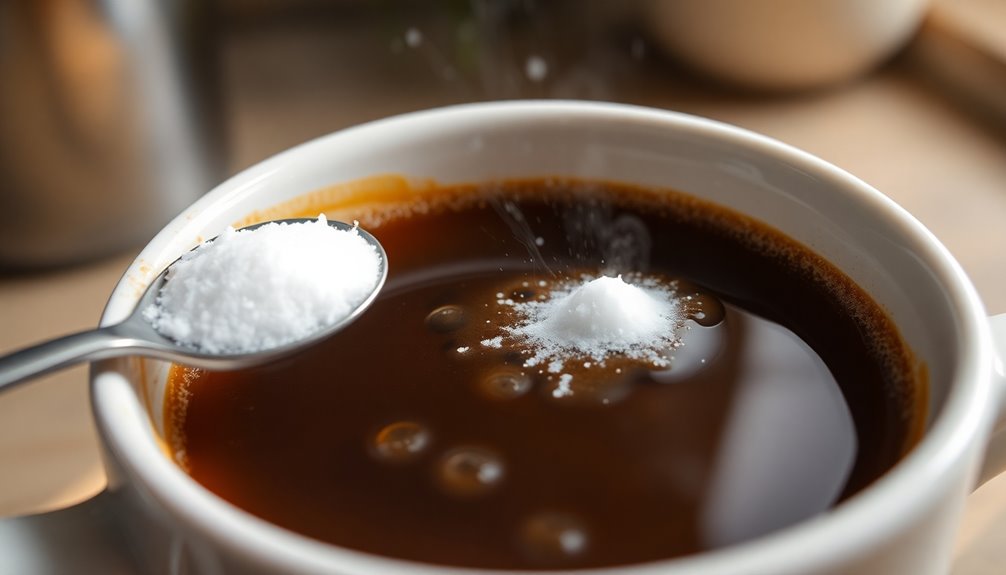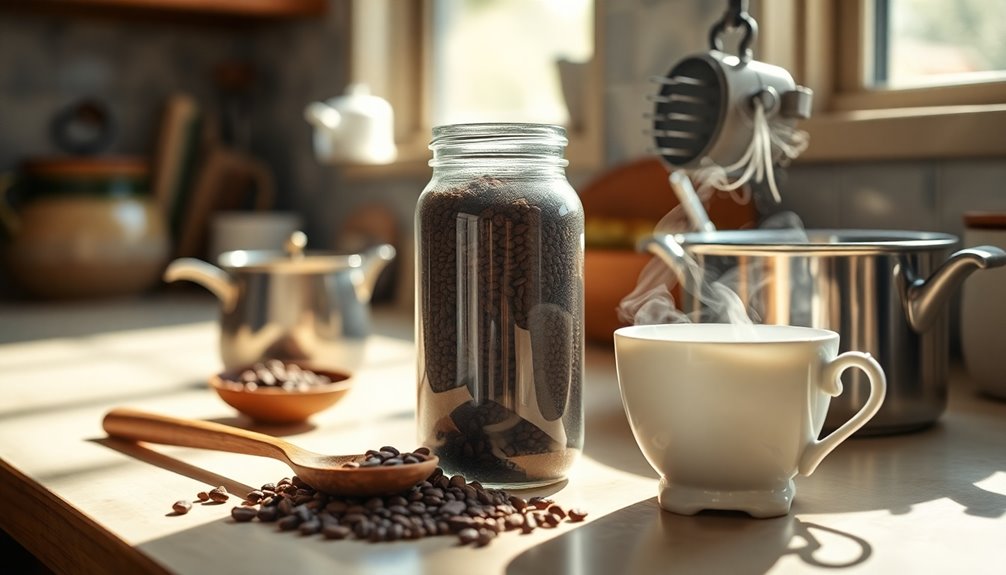Adding baking soda to your coffee can enhance its flavor and reduce acidity, making your cup gentler on your stomach. A pinch can smooth out bitterness, particularly in over-brewed or lower-quality coffee. While it may help alleviate discomfort from acid reflux or ulcers, be cautious about using too much since it can lead to bloating or other digestive issues. Personal tolerance varies, so it's best to start small. If you're curious about the best ways to incorporate this or explore healthier alternatives, there's more to uncover that could elevate your coffee experience.
Key Takeaways
- Baking soda can neutralize coffee acidity, making it easier on the stomach and improving flavor for those sensitive to acidic beverages.
- A small pinch of baking soda can reduce bitterness and burnt flavors, enhancing the overall taste of lower-quality coffee.
- Regular use of baking soda may cause digestive discomfort, so monitor your body's reaction and consult a healthcare professional if necessary.
- High-quality, low-acid coffee beans and alternative methods like cold brewing can naturally enhance coffee flavor without additives.
- Consider your personal health and dietary needs, as well as potential medication interactions, before incorporating baking soda into your coffee routine.
What Happens When You Add Baking Soda?

When you add baking soda to your coffee, it acts as a neutralizer for the acidity, which can be a game-changer if you have a sensitive stomach.
Just a pinch of baking soda can raise the pH level of your brew, potentially alleviating symptoms of acid reflux and heartburn. It not only smooths out the flavor but also mitigates bitterness in over-brewed or burnt coffee, enhancing your overall experience.
If you often find low-quality or highly acidic coffee unpalatable, this simple addition can make a big difference. You'll enjoy a more balanced and enjoyable cup, with the alkaline properties of baking soda working to improve drinkability without overwhelming the essence of your favorite coffee.
Benefits of Reducing Coffee Acidity

Reducing coffee acidity offers numerous benefits, especially for those who struggle with digestive discomfort. By adding a pinch of baking soda to your brew, you can effectively neutralize its natural acidity, raising the pH to a more balanced level.
This simple adjustment may help minimize symptoms of acid reflux and heartburn, making your coffee experience much more enjoyable. For sensitive stomachs, the alkalizing effect of baking soda can greatly improve drinkability.
Additionally, this method can enhance the flavor profile of your coffee by smoothing out harsh tastes without compromising its essence. Furthermore, incorporating baking soda can also promote better digestive health, which is essential for overall well-being.
Impact on Coffee Bitterness

If you find your coffee too bitter, adding a pinch of baking soda can be a game changer.
It not only reduces that burnt flavor but also balances the overall flavor profile, making your cup smoother and more enjoyable.
Plus, this simple addition can enhance the sweetness perception, bringing out the coffee's natural flavors.
Reducing Burnt Coffee Flavor
While you might find that over-brewed or burnt coffee often delivers an unpleasant bitterness, a small pinch of baking soda can work wonders. Its alkaline nature neutralizes the acidic compounds that create harsh flavors, allowing you to enjoy a smoother cup. Just 1/4 teaspoon added during preparation can effectively reduce bitterness without masking the coffee's inherent characteristics.
| Method | Amount of Baking Soda | Result |
|---|---|---|
| Pre-brew Addition | 1/4 teaspoon | Reduces bitterness |
| Brewed Coffee Fix | 1/4 teaspoon | Smooths harsh flavors |
| Quality Control | Low-quality beans | Baking soda improves taste |
| Brewing Technique | Improper methods | Enhances overall enjoyment |
Using baking soda can greatly improve your coffee experience!
Balancing Flavor Profiles
Balancing flavor profiles in coffee can be essential for achieving a satisfying cup, especially when bitterness threatens to overwhelm the experience.
By adding a pinch of baking soda—about 1/4 teaspoon—you can effectively mitigate the bitterness of over-brewed or burnt coffee. This simple addition neutralizes some of the acidic compounds, resulting in a smoother flavor profile that enhances drinkability, particularly for sensitive palates.
If you're using inexpensive coffee varieties often associated with harsh bitterness, baking soda can help balance these flavors, making your brew more enjoyable.
Remember to use it sparingly, as it can improve the overall taste without masking the coffee's unique characteristics, allowing its natural notes to shine through.
Enhancing Sweetness Perception
A small pinch of baking soda can greatly enhance your perception of sweetness in coffee. By adding about 1/4 teaspoon per cup, you'll notice how it helps reduce bitterness and balances the overall flavor.
The alkaline nature of baking soda neutralizes some of the coffee's acidity, creating a smoother taste that many find more enjoyable. This is especially beneficial for those sensitive to the harsh flavors often present in cheaper or darker roasts.
As the bitterness diminishes, sweeter notes in your coffee emerge, making each sip more pleasant. So, if you're looking to enhance sweetness while softening the taste of your brew, consider giving baking soda a try. You might be pleasantly surprised by the difference it makes!
Baking Soda for Ulcer Relief

If you're struggling with ulcers, baking soda might just be a helpful addition to your coffee routine.
By neutralizing stomach acid, it can make your favorite beverage easier on your stomach.
Let's explore the alkaline benefits, dosage recommendations, and some personal experiences with this remedy.
Alkaline Benefits Explained
While many coffee lovers enjoy their daily brew, those with ulcers often struggle with the acidity that can aggravate their condition.
Baking soda acts as a natural antacid, helping to neutralize stomach acid and providing relief. By adding a small amount—typically 1/4 teaspoon—of baking soda to your low-acid coffee, you can raise its pH to a more neutral state, making it gentler on your stomach.
This alkaline effect may reduce nausea and discomfort, allowing you to savor your coffee without worry. Research shows that baking soda can also alleviate symptoms of heartburn and indigestion, common issues for ulcer sufferers.
Regularly using baking soda in your coffee can enhance drinkability, promoting comfort without adding calories or sugars.
Dosage Recommendations
To effectively use baking soda for ulcer relief in your coffee, aim for a dosage of about 1/4 teaspoon per cup. This small amount can help neutralize acidity and reduce discomfort.
If you're brewing a full pot, you can add baking soda by mixing in about 1/2 teaspoon to achieve a better pH balance.
When you add baking soda, make certain to mix it thoroughly into the coffee grounds or brewed coffee to guarantee even distribution and maximize its antacid effects.
Keep an eye on how your body reacts, as excessive intake might lead to digestive discomfort. It's important to remember that baking soda's antacid properties can help alleviate symptoms associated with high acidity.
If symptoms persist, it's best to consult a healthcare professional for personalized advice on your coffee and baking soda routine.
Personal Experiences Shared
Many individuals have found relief from ulcer symptoms by adding baking soda to their coffee. By neutralizing stomach acid, this combination makes coffee more tolerable for those with ulcers. Many users swear by this method, sharing how it alleviates discomfort.
Here are some key benefits they've experienced:
- Reduced heartburn and acid reflux symptoms
- Improved overall coffee drinkability
- A tasteless addition that doesn't alter flavor
- Easier mornings without harsh coffee effects
- A simple, inexpensive solution for relief
Incorporating about 1/4 teaspoon of baking soda per cup can greatly enhance your coffee experience, allowing you to enjoy your daily brew without the discomfort often associated with traditional coffee.
How to Add Baking Soda

Adding baking soda to your coffee can enhance its flavor and reduce acidity, making your morning brew smoother.
Start by adding a pinch of baking soda—about 1/4 teaspoon—for each cup of brewed coffee. If you're making a full pot, you can use up to 1/2 teaspoon, but make sure to mix it well for even distribution.
It's best to incorporate baking soda before brewing or during preparation to guarantee it dissolves completely. As you experiment, adjust the amount gradually to find the balance that suits your taste and digestive comfort.
Keep an eye on how your body reacts, as too much can cause digestive discomfort or interact with medications, so consider talking to a healthcare professional if needed.
Community Practices and Beliefs

While some may prefer their coffee black, many communities have embraced the practice of adding baking soda as a way to enhance flavor and reduce acidity.
In certain settings, especially churches, this tradition aims to improve the drinkability of less expensive coffee. Families often pass down this practice, making it a cherished part of their coffee rituals.
Here are some community practices and beliefs around adding baking soda:
- It smooths out harsh flavors in cheap coffee.
- Some believe it neutralizes acidity, making coffee easier on the stomach.
- It's seen as a cultural tradition in various regions.
- Discussions among coffee lovers frequently feature this modification.
- Anecdotal experiences shape personal preferences and practices.
Quality Alternatives to Baking Soda

If you’re looking to enhance your coffee experience without relying on baking soda, there are several quality alternatives to contemplate. One popular option is using ground cardamom, which adds a unique and fragrant flavor to your coffee. Another alternative is chicory root, known for its rich and slightly bitter taste that complements coffee well. If you’re looking to try something different, consider what is pero coffee substitute and see if it suits your taste preferences. This natural coffee alternative is made from barley, chicory, and rye, giving it a bold and robust flavor that mimics the taste of traditional coffee.
Investing in high-quality, low-acid coffee beans can create a smoother taste, reducing the need for additives. Specialty brands often offer blends designed for sensitive stomachs, featuring naturally lower-acidity beans.
Opting for dark roasts can also help, as they're generally less acidic than lighter varieties.
Additionally, consider cold brewing, which produces a milder flavor and lower acidity, making baking soda unnecessary.
Finally, you might try adding crushed egg shells during brewing; they can neutralize acidity without changing your coffee's taste. Moreover, pairing your coffee with a delicious breakfast option like the Egg Rollup and Dumpling Sauce can enhance your morning routine and provide a nutritious start to your day.
These options can greatly improve your cup while catering to your preferences and needs.
Health Considerations and Risks

Though baking soda can seem like a quick fix for coffee's acidity, it's important to contemplate the potential health risks associated with its use. Excessive sodium intake from baking soda may lead to serious health risks, particularly if you have hypertension or are on a low-sodium diet.
You should also be aware that:
- Baking soda can interact with certain medications.
- Small amounts are generally safe, but excess can cause digestive issues.
- Bloating and gas are common side effects of overconsumption.
- Monitor your reactions if you have gastrointestinal conditions like ulcers or IBS.
- Regular use might mask more serious digestive issues requiring medical attention.
Additionally, understanding state tax implications of health-related expenses can be crucial for maintaining financial wellness. Consult with a healthcare provider before adding baking soda to your coffee routine to guarantee safety.
Frequently Asked Questions
Is It Healthy to Put Baking Soda in Your Coffee?
When considering if it's healthy to put baking soda in your coffee, think about your own sensitivities. A small amount can neutralize acidity, potentially easing discomfort for those prone to heartburn.
However, be cautious—too much can increase sodium intake, which isn't ideal for everyone. Start with a tiny amount and pay attention to how your body reacts.
It might enhance your coffee experience, but moderation is key to avoid any negative effects.
How Much Baking Soda Should I Add to Coffee?
Did you know that about 60% of coffee drinkers struggle with acidity?
If you're looking to reduce that acidity, start by adding 1/4 teaspoon of baking soda per cup. For larger pots, you can use up to 1/2 teaspoon, but make sure it's well mixed.
It's best to begin with a small pinch and adjust based on your taste and how your body reacts.
Just remember, moderation is key to avoid any unpleasant flavors!
How Much Baking Soda Is Safe to Drink Daily?
To stay safe, you shouldn't consume more than a few teaspoons of baking soda daily.
It's important to monitor your intake, especially if you're on a low-sodium diet or have certain health conditions.
Start with small amounts, like 1/4 teaspoon per serving, and pay attention to how your body reacts.
If you experience any discomfort, it's best to cut back or consult a healthcare provider for personalized advice.
Why Do I Feel Better After Drinking Baking Soda?
If you've ever wondered why you feel better after drinking baking soda, you're not alone.
Baking soda's alkaline attributes neutralize stomach acidity, easing discomfort and providing sweet relief from heartburn. When you sip it, your stomach's pH levels rise, leading to a more comfortable digestive experience.
This soothing solution may also diminish bitterness in beverages, making your drink delightful while delivering digestive comfort.
You're likely enjoying a more pleasant tummy after indulging!
Conclusion
So, if you're curious about adding baking soda to your coffee, think of it as a sprinkle of magic that might transform your morning brew. It could soften the sharp edges, making your cup smoother and gentler on your stomach. Just remember, a little goes a long way, and not every potion suits every palate. Experiment with this curious blend, but keep your health in mind, like a wise alchemist tending to their concoctions.









